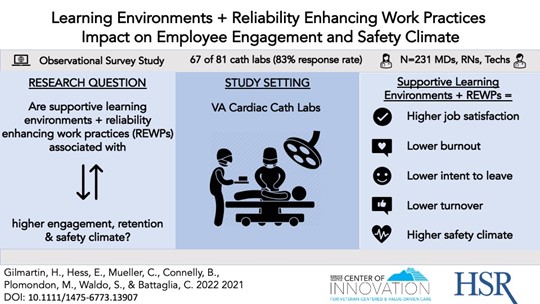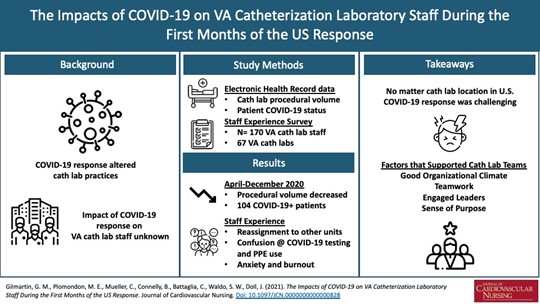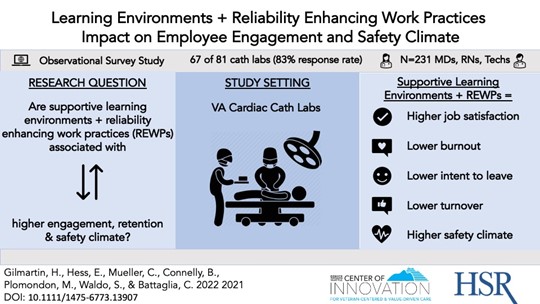Seattle-Denver Center of Innovation (COIN)
The Relational Playbook for Healthcare Teams

Relational Playbook for Healthcare Teams Contributes to VHA's Push toward Becoming a High Reliability Organization
The Relational Playbook for Healthcare Teams Overview
This video is a recorded presentation by Dr. Heather Gilmartin that provides an overview of the research that led to the creation of the Relational Playbook for Healthcare Teams. This presentation was developed for the 2023 Relational Coordination Roundtable meeting.
Watch: The Relational Playbook for Healthcare Teams Overview
The Veterans Health Administration (VHA) is undergoing a transformational modernization at a scale and scope not undertaken since the 1940s. At the core of this transformation is a cultural shift toward becoming a High Reliability Organization (HRO).
An HRO experiences fewer than anticipated accidents or events of harm to patients despite operating in highly complex, high-risk environments where even small errors can lead to tragic results (FORUM, 2020). Contributing to this over-arching mission is the development of a Relational Playbook for Healthcare Teams.
The Relational Playbook for Healthcare Teams will assist managers, educators, and clinical staff in assessing and improving relationships and communication. The Playbook has been registered as an "invention" with the VA Technology Transfer Office due to its potential for commercialization to benefit Veterans and the American public.
Supported by an HSR Career Development Award (CDA), Heather Gilmartin, PhD, NP, part of HSRs Denver/Seattle Center of Innovation for Veteran-Centered and Value-Driven Care, sought to shift the current paradigm for learning from standardized procedurally-focused educational methods to one that provides teams with HRO and Learning Health System guided resources and interventions.
The goal is to build supportive learning environments that include relationship development, communication skills, and teamwork content in meetings and trainings to help change VA’s culture toward learning and high reliability to enhance Veteran care. Dr. Gilmartin partnered with the VA National Cardiology Program, the VA Clinical Assessment, Reporting and Tracking (CART) program, and VA cardiac catheterization laboratories (cath labs) for this research.
Cath labs are a really strange place to work. The skill set here is really unlike anywhere else in the hospital. The level of technical responsibility is immense. Physicians depend on us to be doing things and having a level of clinical competence that I don't think really transfers to any other area of the hospital. — VA Cath Lab Nurse
Supportive learning environments build capabilities for teaching and learning, empower teams to safely try new things, and adopt highly reliable work practices (e.g., debriefs). However, during her research, Dr. Gilmartin noted that guidance on how to develop high-quality relationships and communication and create supportive learning environments was universally lacking.
To fill this gap, she surveyed VA cath lab staff in 2018 and 2020, interviewed cath lab clinicians and managers, and reviewed the literature to gather best practices. The information gleaned from these sources led to the development of the Relational Playbook. The Playbook is a five-chapter eBook that includes resources and 50 evidence-based interventions organized into five interconnected chapters:
- Creating a Positive Culture
- Teamwork
- Leading Teams
- Creating Joy in Work
- Communication & High Reliability
The Playbook is different from existing workshops, books, or toolkits in the following ways:
- The content is inspired by and designed for VA healthcare teams;
- The language is simple, and the 50 evidence-based practices are designed to be implemented within existing trainings, meetings, or huddles; and
- The Playbook is an entry-level guide for teams to change their culture towards learning and high reliability.
Implications & Next Steps
The Relational Playbook is designed to help move teams from good to great, while ensuring patient safety, improving employee engagement, and lowering burnout and turnover.
To establish the Relational Playbook as a feasible and acceptable tool, Dr. Gilmartin will be:
- Piloting the Playbook in VA cardiac cath labs and rural inpatient medical teams;
- Testing the effectiveness of the Playbook interventions on the systemic factors contributing to burnout, turnover, and variations in care, and;
- Adapting the Playbook for diverse clinical teams, non-procedural settings, and other healthcare systems to support widespread implementation.
Partners
VA Technology Transfer, VA National Cardiology Program Office, VA Clinical Assessment, Reporting and Tracking (CART) Program, and the VA Office of Nursing Services (ONS).
Complete the Learning Environment Assessment tool and download the Relational Playbook for Cardiology Teams - Introduction.
For more information, please contact Dr. Heather Gilmartin at heather.gilmartin@va.gov
Grants
- The Pilot Feasibility and Acceptability Study of a Relational Playbook and Coaching Intervention for Cardiology Teams to Enhance Employee Well-Being and Veteran Care
- PI: Heather Gilmartin, PhD, NP
- This six-site randomized clinical trial will establish the feasibility and acceptability of a Relational Playbook workforce development intervention with a leadership coaching implementation strategy. Cardiac catheterization laboratory nurse managers will implement the Playbook, with 3 randomized to receive leadership coaching and 3 to receive standard implementation support. This work will provide information to support a national trial.
- Funder: Veterans Affairs
- The Acute Inpatient Medicine-High Reliability, Learning Environment and Workforce Development Initiative
- PI: Heather Gilmartin, PhD, NP
- The goal of this 3-year operational program funded by the VA Office of Rural Health is to enhance learning, teamwork, and high reliability in rural healthcare teams to build a culture that ensures patient safety, improves employee engagement and retention, and lowers burnout and turnover. Operational Partners: VA Hospital Medicine National Program Office, VA Office of Nursing Services
- Funder: Veterans Affairs - Office of Rural Health
Publications
- Developing a relational playbook for cardiology teams to cultivate supportive learning environments, enhance clinician well-being, and veteran care
- Introduction: Despite the Veterans Health Administration (VA) efforts to become a learning health system (LHS) and high-reliability organization (HRO), interventions to build supportive learning environments within teams are not reliably implemented, contributing to high levels of burnout, turnover, and variation in care. Supportive learning environments build capabilities for teaching and learning, empower teams to safely trial and adapt new things, and adopt highly reliable work practices (eg, debriefs). Innovative approaches to create supportive learning environments are needed to advance LHS and HRO theory and research into practice.
Methods: To guide the identification of evidence-based interventions that cultivate supportive learning environments, the authors used a longitudinal, mixed-methods design and LHS and HRO frameworks. We partnered with the 81 VA cardiac catheterization laboratories and conducted surveys, interviews, and literature reviews that informed a Relational Playbook for Cardiology Teams.
Results: The Relational Playbook resources and 50 evidence-based interventions are organized into five LHS and HRO-guided chapters: Create a positive culture, teamwork, leading teams, joy in work, communication, and high reliability. The interventions are designed for managers to integrate into existing meetings or trainings to cultivate supportive learning environments.
Conclusions: LHS and HRO frameworks describe how organizations can continually learn and deliver nearly error-free services. The Playbook resources and interventions translate LHS and HRO frameworks for real-world implementation by healthcare managers. This work will cultivate supportive learning environments, employee well-being, and Veteran safety while providing insights into LHS and HRO theory, research, and practice.
Keywords: high‐reliability organization; learning health system; veterans; workforce.
Published 2023. This article is a U.S. Government work and is in the public domain in the USA. Learning Health Systems published by Wiley Periodicals LLC on behalf of University of Michigan. - Gilmartin HM, Connelly B, Hess E, Mueller C, Plomondon ME, Waldo SW, Battaglia C. Developing a relational playbook for cardiology teams to cultivate supportive learning environments, enhance clinician well-being, and veteran care. Learn Health Syst. 2023 Aug 10;8(2):e10383. doi: 10.1002/lrh2.10383. PMID: 38633018; PMCID: PMC11019383.
- Implementation of the Acute Inpatient Medicine—High Reliability, Learning Environment, and Workforce Development Initiative (AIM‐HI) in rural Veterans Health Administration hospitals: A mixed methods evaluation protocol
- Introduction: Few rural hospital medicine programs include workforce development training that provides social and professional support for interdisciplinary teams. Even fewer include training that creates supportive learning environments that result in higher staff satisfaction, lower burnout, and reduced turnover. The Acute Inpatient Medicine-High Reliability, Learning Environment, and Workforce Development Initiative (AIM-HI) aims to create supportive learning environments in Veterans Health Administration (VA) rural hospital medicine teams.
Methods: AIM-HI is a type II hybrid implementation study utilizing a convergent mixed methods approach to evaluate the Relational Playbook, a workforce development intervention, and three implementation strategies: behavioral nudges, learning and leadership collaboratives, and leadership coaching. AIM-HI implementation will occur in waves, enrolling additional hospitals every 12 months. In the first wave, AIM-HI will be implemented at three tertiary VA hospitals that treat at least 1000 rural Veterans annually and have an active inpatient hospital medicine program. The primary outcomes in year 1 will be the acceptability, appropriateness, and feasibility of AIM-HI assessed through participant surveys and interviews. In subsequent years, trends in the learning environment, job satisfaction, burnout, and turnover scores will be assessed using a linear mixed-effect model.
Discussion: The anticipated impact of AIM-HI is to evaluate the utility of the implementation strategies and assess trends in Playbook intervention outcomes. The Playbook has strong face validity; however, before large-scale adoption across the VA enterprise, it is essential to establish the acceptability, appropriateness, and feasibility of the Playbook and implementation strategies, as well as to gather data on AIM-HI effectiveness.
Published 2024. This article is a U.S. Government work and is in the public domain in the USA. Journal of Hospital Medicine published by Wiley Periodicals LLC on behalf of Society of Hospital Medicine. - Gilmartin HM, Connelly B, Daus M, Hess E, Leonard C, Morgan B, Nolan JP Jr, Perry P, Sjoberg H, Subramaniam S, Anderson ML 3rd. Implementation of the Acute Inpatient Medicine-High Reliability, Learning Environment, and Workforce Development Initiative (AIM-HI) in rural Veterans Health Administration hospitals: A mixed methods evaluation protocol. J Hosp Med. 2024 Aug 16. doi: 10.1002/jhm.13474. Epub ahead of print. PMID: 39149834.
- A Pilot Study to Assess the Learning Environment and Use of Reliability Enhancing Work Practices in VHA Cardiac Catheterization Laboratories
- A learning health system (LHS) harnesses data and analytics to learn from clinical encounters to implement the best care with high reliability. The 81 Veterans Health Administration (VHA) cardiac catheterization laboratories (cath lab) are a model LHS. The quality and safety of coronary procedures are monitored and reported by the Clinical Assessment, Reporting and Tracking (CART) Program, which has identified variation in care across cath labs. This variation may be due to underappreciated aspects of LHSs, the learning environment and reliability enhancing work practices (REWPs). Learning environments are the educational approaches, context, and settings in which learning occurs. REWPs are the organizational practices found in high reliability organizations. High learning environments and use of REWPs are associated with improved outcomes. This study assessed the learning environments and use of REWPs in VHA cath labs to examine factors supportive of learning and high reliability.
- Principal Investigator: Heather Gilmartin, PhD, NP
-

Learning Environments & Reliability Enhancing Work Practices Impact
on Employee Engagement and Safety Climate
The Impact of COVID-19 on VA Cath Lab Staff During the First Six Months of the US Response
Background: The COVID-19 pandemic has altered catheterization laboratory (cath lab) practices in diverse ways.
Methods: Procedural volume and COVID-19 patient data were obtained from the Clinical, Assessment, Reporting and Tracking Program. A mixed methods survey was emailed to VA cath lab staff asking about the COVID-19 response. Descriptive and manifest content analyses were conducted.
Results: Procedural volume decreased from April to September 2020. One hundred four patients with known COVID-19 were treated. Survey response rate was 19% of staff (n = 170/902) from 83%of VA cath labs (n = 67/81). Reassignment to other units, confusion regarding COVID-19 testing, personal protective equipment use, and low patient volume were reported. Anxiety, burnout, and leadership's role on team morale were described.
Conclusions: Some teams adapted. Others expressed frustration over the lack of control over their practice. Leaders should routinely assess staff needs during the current and future crises.
Principal Investigator: Heather Gilmartin, PhD, NP

Learning environments, reliability enhancing work practices, employee engagement, and safety climate in VA cardiac catheterization laboratories
Objective: To characterize the relationship between learning environments (the educational approaches, cultural context, and settings in which teaching and learning happen) and reliability enhancing work practices (hiring, training, decision making) with employee engagement, retention, and safety climate.
Data source: We collected data using the Learning Environment and High Reliability Practices Survey (LEHRs) from 231 physicians, nurses, and technicians at 67 Veterans Affairs cardiac catheterization laboratories who care for high-risk Veterans.
Study design: The association between the average LEHRs score and employee job satisfaction, burnout, intent to leave, turnover, and safety climate were modeled in separate linear mixed effect models adjusting for other covariates.
Data collection: Participants responded to a web-only survey from August through September 2020.
Principal findings: There was a significant association between higher average LEHRs scores and
(1) higher job satisfaction
(2) lower burnout,
(3) lower intent to leave,
(4) lower cath lab turnover in the previous 12 months, and (5) higher perceived safety climate.
Conclusions: Learning environments and use of reliability enhancing work practices are potential new avenues to support satisfaction and safety climate while lowering burnout, intent to leave, and turnover in a diverse US health care workforce that serves a vulnerable and marginalized population.
Go to Learning environments, reliability enhancing work practices, employee engagement, and safety climate in VA cardiac catheterization laboratories to read the full article.
Principal Investigator: Heather Gilmartin, PhD, NP





















